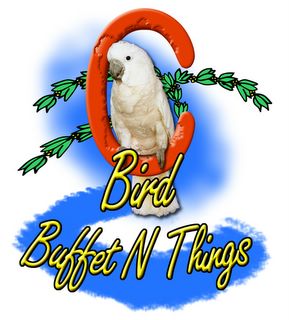Psittacosis - 5 Ways to Lessen the Chance of Psittacosis in Your Home
By Debbie Davis
Psittacosis sometimes referred to as Parrot Fever or Bird Fancier's Lung (BFL) is a disease that all species of birds are susceptible to, and one that can be passed to humans as well. Pet birds are the most frequent transmitters of the disease especially many types of Parrots. If recognized and treated early with antibiotics, the recovery rate for birds and humans is good. Here are 5 ways to go on the offensive against Psittacosis and lessen the chance of having it develop in your home.
Keep the Cage Clean--One of the ways this disease spreads is through dried dust from bird feces. Once the fecal matter starts to dry, minute pieces can become airborne with the bird's movement, your movement or even circulating air from the air conditioner or heat. Changing the paper at the bottom of the cage daily or even more frequently lessens the chance of these airborne contagions spreading and being inhaled by you, family members, and your bird.
Become Familiar with Symptoms in Birds--This is easier said than done as many birds that are infected do not present symptoms. However, the symptom that is most indicative of this condition is eye discharge. Others include diarrhea, difficulty in breathing, a drop in energy level producing drowsiness and lethargy, puffed up feathers, tremors, disinterest in food, and weight loss. Knowing what is usual for your bird will help you spot any changes in behavior easily and allow you to take preventive steps early.
Regular Check Ups with the Veterinarian-You don't have to go it alone when trying to recognize whether a change in your bird's habits is an indication of sickness, and more specifically Psittacosis. Having an avian veterinarian that you trust is an invaluable resource to locate and use from the moment you bring your bird home. Don't be afraid to take your bird for professional observation if there is even the slightest question about your bird's health. The sooner the disease is correctly diagnosed, the better chance your bird has of surviving. And even if it turns out to be a false alarm--better safe than sorry.
Recognize Human Symptoms--In people the symptoms are similar to the flu-headache, chills, fever, aches and pains. When seeking treatment for flu-like symptoms mention that you have a bird, and ask to be tested for Psittacosis.
Use a Purifier to Filter Your Air--Nothing can guarantee that you and your bird won't contract this disease, but given that it spreads with inhalation of dried fecal matter that is airborne, using a high efficiency particle arresting air purifier is a good way to clear the air and lessen the chance of having this disease spread in your home.
An excellent resource for an air purifier to lessen the chance of Psittacosis in your home is offered by PurerAir.com-- the Bird Dander Purifier at http://purerair.com/bird_dander_air_purifier.html
Article Source: http://EzineArticles.com/?expert=Debbie_Davis
http://EzineArticles.com/?Psittacosis---5-Ways-to-Lessen-the-Chance-of-Psittacosis-in-Your-Home&id=1880973
To purchase supplements, please visit Bird Buffet N Things. They carry a full line of Morning Bird products for most illinesses.








